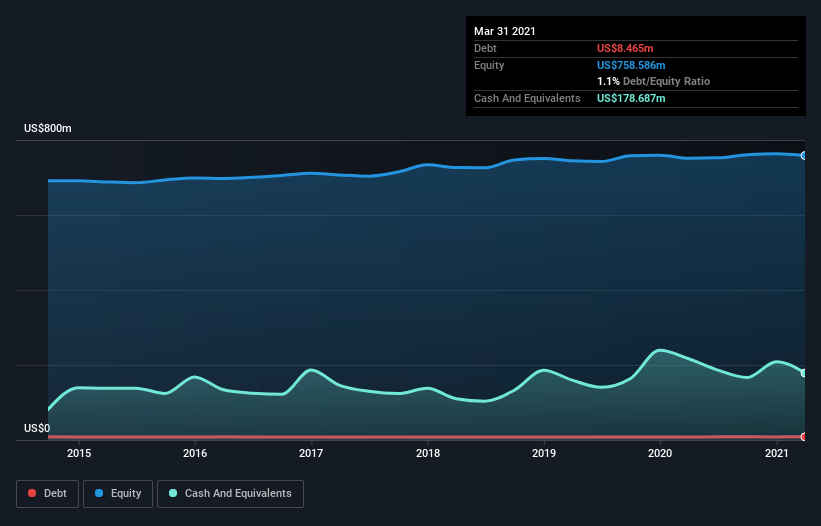These 4 Measures Indicate That Tootsie Roll Industries (NYSE:TR) Is Using Debt Reasonably Well
Legendary fund manager Li Lu (who Charlie Munger backed) once said, 'The biggest investment risk is not the volatility of prices, but whether you will suffer a permanent loss of capital.' It's only natural to consider a company's balance sheet when you examine how risky it is, since debt is often involved when a business collapses. Importantly, Tootsie Roll Industries, Inc. (NYSE:TR) does carry debt. But should shareholders be worried about its use of debt?
When Is Debt A Problem?
Debt is a tool to help businesses grow, but if a business is incapable of paying off its lenders, then it exists at their mercy. In the worst case scenario, a company can go bankrupt if it cannot pay its creditors. However, a more frequent (but still costly) occurrence is where a company must issue shares at bargain-basement prices, permanently diluting shareholders, just to shore up its balance sheet. Of course, plenty of companies use debt to fund growth, without any negative consequences. The first step when considering a company's debt levels is to consider its cash and debt together.
View our latest analysis for Tootsie Roll Industries
What Is Tootsie Roll Industries's Debt?
As you can see below, Tootsie Roll Industries had US$8.47m of debt, at March 2021, which is about the same as the year before. You can click the chart for greater detail. However, it does have US$178.7m in cash offsetting this, leading to net cash of US$170.2m.
A Look At Tootsie Roll Industries' Liabilities
We can see from the most recent balance sheet that Tootsie Roll Industries had liabilities of US$65.9m falling due within a year, and liabilities of US$154.5m due beyond that. Offsetting this, it had US$178.7m in cash and US$36.4m in receivables that were due within 12 months. So its liabilities total US$5.35m more than the combination of its cash and short-term receivables.
Having regard to Tootsie Roll Industries' size, it seems that its liquid assets are well balanced with its total liabilities. So while it's hard to imagine that the US$2.26b company is struggling for cash, we still think it's worth monitoring its balance sheet. Despite its noteworthy liabilities, Tootsie Roll Industries boasts net cash, so it's fair to say it does not have a heavy debt load!
In fact Tootsie Roll Industries's saving grace is its low debt levels, because its EBIT has tanked 34% in the last twelve months. Falling earnings (if the trend continues) could eventually make even modest debt quite risky. The balance sheet is clearly the area to focus on when you are analysing debt. But it is Tootsie Roll Industries's earnings that will influence how the balance sheet holds up in the future. So when considering debt, it's definitely worth looking at the earnings trend. Click here for an interactive snapshot.
Finally, a company can only pay off debt with cold hard cash, not accounting profits. While Tootsie Roll Industries has net cash on its balance sheet, it's still worth taking a look at its ability to convert earnings before interest and tax (EBIT) to free cash flow, to help us understand how quickly it is building (or eroding) that cash balance. Over the last three years, Tootsie Roll Industries recorded free cash flow worth a fulsome 97% of its EBIT, which is stronger than we'd usually expect. That positions it well to pay down debt if desirable to do so.
Summing up
While it is always sensible to look at a company's total liabilities, it is very reassuring that Tootsie Roll Industries has US$170.2m in net cash. And it impressed us with free cash flow of US$57m, being 97% of its EBIT. So we don't have any problem with Tootsie Roll Industries's use of debt. The balance sheet is clearly the area to focus on when you are analysing debt. But ultimately, every company can contain risks that exist outside of the balance sheet. For instance, we've identified 1 warning sign for Tootsie Roll Industries that you should be aware of.
Of course, if you're the type of investor who prefers buying stocks without the burden of debt, then don't hesitate to discover our exclusive list of net cash growth stocks, today.
This article by Simply Wall St is general in nature. It does not constitute a recommendation to buy or sell any stock, and does not take account of your objectives, or your financial situation. We aim to bring you long-term focused analysis driven by fundamental data. Note that our analysis may not factor in the latest price-sensitive company announcements or qualitative material. Simply Wall St has no position in any stocks mentioned.
Have feedback on this article? Concerned about the content? Get in touch with us directly. Alternatively, email editorial-team (at) simplywallst.com.

